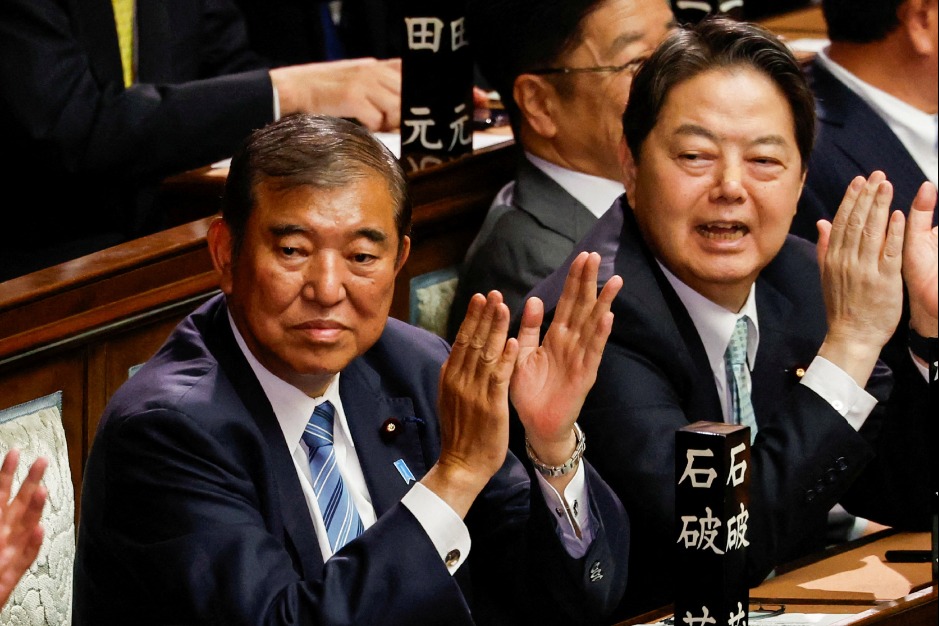Japan's parliament reelects Ishiba as PM
Govt to face challenges in the absence of majority in lower house, experts say


Shigeru Ishiba was reelected as Japan's 103rd prime minister on Monday in a House of Representatives runoff election, securing 221 votes. Experts said his administration will likely face increased challenges in passing its preferred bills, as this will require behind-the-scenes negotiations with the opposition.
Yoshihiko Noda, leader of the Constitutional Democratic Party of Japan, or CDP, came in second with 160 votes. In the first round, Ishiba and Noda received 221 and 151 votes, respectively, with other candidates trailing behind. Since no candidate passed the majority threshold of 233 votes, the election advanced to a runoff.
The second Ishiba Cabinet was inaugurated on Monday evening. Ishiba replaced the minister of justice and the minister of agriculture, forestry and fisheries, both of whom lost their seats in the House of Representatives election. He also appointed Hiromasa Nakano, a member of the junior ruling coalition partner Komeito, as transport minister, to replace Tetsuo Saito, who vacated the Cabinet post to become the leader of the Komeito.
Ishiba's reelection as prime minister was largely because the opposition parties failed to unite behind Noda, said Kazuyuki Hamada, an international political economy scholar and Japan's former parliamentary vice-minister for foreign affairs.
Ishiba's Liberal Democratic Party, or LDP, lost a considerable number of seats in the recent House of Representatives election, and even in the coalition with Komeito, it could not secure a majority.
If the opposition had united behind Noda of the CDP, he would likely have become prime minister, Hamada said.
The LDP remains Japan's largest party, maintaining a dominant coalition with Komeito. However, the opposition is divided: the CDP is positioned to the left of the LDP, while the Japan Innovation Party leans to the right, making cooperation between them unlikely, experts said.
"Given the numbers alone, Ishiba's selection was the natural outcome," said Ukeru Magosaki, director of the East Asian Community Institute.
"The LDP once held an outright majority, enabling it to pass almost any bill, but it no longer holds such power alongside Komeito. This change requires the LDP to negotiate each bill with the opposition, meaning they must incorporate some opposition demands, which makes it harder to pass their preferred legislation," Magosaki said.
Seeking cooperation
Ishiba held successive meetings on Monday with Noda and Yuichiro Tamaki, leader of the Democratic Party for the People, or DPP, seeking their cooperation in managing the Diet, Japan's national legislature. Noda called for revising the Political Funds Control Act, in line with the CDP's stance, while Tamaki advocated for economic policies aimed at increasing income.
However, a recent scandal could complicate the LDP-Komeito coalition's discussions with the DPP.
DPP leader Tamaki admitted on Monday to an extramarital affair with a tourism ambassador of Takamatsu, Kagawa Prefecture. Following a tabloid magazine report, Tamaki apologized at a news conference, acknowledging the story's accuracy while also expressing his intention to continue as party leader to pursue his policy goals.
"Ishiba's administration will face increasingly challenging management going forward. … Although there are discussions about possible collaboration with the DPP on a policy-by-policy basis, Tamaki's recent scandal may leave the party without stable leadership," said Hamada.
Additionally, on the issue of political funding, criticism is emerging from opposition parties and Komeito. Unless the flow of political funds is clarified and suspicions about "secret funds" are addressed, Ishiba's administration could face a crisis. Failure to address these issues could prompt a change in prime minister before the House of Councillors election next year, Hamada warned.
He further noted that the House of Councillors election is expected to bring even stronger challenges for the LDP and Komeito than the recent House of Representatives election. Voters are focused on inflation measures, job stability, and tax reforms to boost take-home pay. If these issues remain unaddressed, both the Ishiba administration and the LDP risk losing their relevance with voters.
"For Ishiba to survive politically, he has no choice but to address public concerns head-on and present concrete economic policies," Hamada said.
































